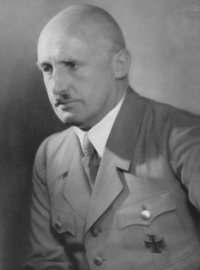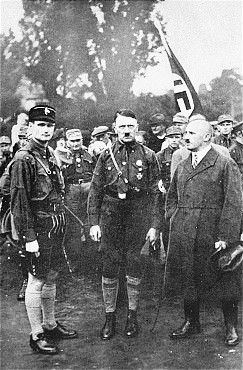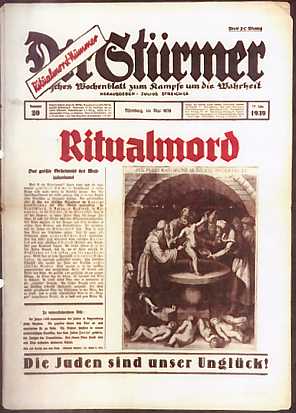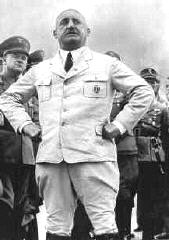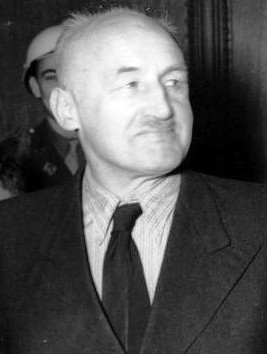Holocaust Education & Archive Research Team |
|
Holocaust Prelude Early Nazi Leaders Nazi Propaganda Nazi Racial Laws Sinti & Roma Kristallnacht The SS SS Leadership Wannsee
Prelude Articles Image Galleries
| |||||
Julius Streicher The Beast of Franconia
Julius Streicher was born on 12 February 1885 in the Upper Bavarian village of Fleinhausen. An elementary school teacher by profession, Streicher served in a Bavarian unit during the Great War and despite a warning for bad behaviour was awarded the Iron Cross First Class, and he rose from enlisted man to lieutenant.
In 1919 he co-founded the anti-Semitic Deutsch-Soziale Partei and two years later joined the NSDAP, taking his own Party membership with him. Streicher was an intimate friend of Adolf Hitler and one of the earliest supporters of Nazism in northern Bavaria.
In 1925 he was appointed Gauleiter of the NSDAP for Franconia and his headquarters in Nuremberg became a leading centre for violent anti-Semitism in Germany. Streicher’s unbecoming conduct and diatribes against the Weimar Government led to his dismissal from his teaching post in 1928.
A year later he was elected as a Nazi member of the Bavarian legislature. Streicher was a tireless speaker and plebeian rabble-rouser, whose political influence derived largely from the impact of Der Stürmer, which he founded in 1923 and continued to edit until 1945.
This weekly newspaper became the world’s best known anti-Semitic publication with its crude cartoons, repellent photographs of Jews, its stories of ritual murder, pornography and its coarse prose style.
Streicher reached millions of Germans, through his newspaper columns, and his endless speaking tours imbuing them, with his own poisonous brew of hatred, sadism and perversity. The impact of Der Stürmer as greatly enhanced by a nationwide system of display cases (Stürmerkasten) put up in parks, public squares, factory canteens, at street corners and bus stops, to attract passers- by.
Their visual impact, their racists slogans and scandal- mongering style drew crowds, Der Stürmer consistently carried large- print slogans such as “Avoid Jewish Doctors and Lawyers” and gave listings of Jewish dentists, shopkeepers, and professional people whom “Aryans” were urged to avoid.
Those who ignored this advice were in danger of having their own names and addresses listed. Letters to the editor denouncing Jews – and Germans who patronised them – became a regular feature of Der Stürmer, which claimed in 1935 that it was receiving 11,000 letters a week.
The “Pillory” column created a climate of fear and intimidation not only in Nuremberg – where Streicher dominated all spheres of life – but throughout the Reich. Through Der Stürmer , Streicher provided a focus for the anti-Jewish measures of Nazi Germany, pressing already in 1933, for the banning of Jews from public baths, places of entertainment, State schools etc.
After Streicher spoke in Magdeburg in 1935, Jews were barred from using public transport, the general campaign which led to the Nuremberg racial laws in 1935 was initiated by his newspaper.
One of Streicher’s most enthusiastic readers was Adolf Hitler, who declared that Der Stürmer was the only paper which he read avidly from first to last page. Undoubtedly the Fuhrer protected Streicher raising him to high office and praising him as the “friend and comrade in arms” who never wavered and would unflinchingly stand behind him in every situation.”
Although aware of Streicher’s widespread unpopularity and unsavoury reputation, Hitler regarded him as a man of spirit, extremely useful, if not irreplaceable. He considered the Franconian Gauleiter’s primitive methods to be very effective especially appealing to the ordinary man in the street.
Hitler told Hermann Rauschning that he gave Streicher a free hand because anti-Semitism was the most important weapon in the Nazi arsenal. In spite of repeated requests to suppress Der Stürmer as a “cultural disgrace,” Hitler personally ordered that no action be taken and declared that Streicher’s material was amusing and very cleverly done.
Streicher’s opponents complained to authorities that Der Stürmer violated a statute against religious offense with his constant promulgation of the “blood libel” – the medieval accusation that Jews killed Christian children to use their blood to make matzoh. Streicher argued that his accusations were based on race, not religion, and that his diatribes were political speech, and therefore protected by the German constitution.
The German public appeared to share this view since Der Stürmer circulation rose from 2-3,000 in 1923 to 65,000 in 1934 and close on 500,000 in 1937. Circulation of Der Stürmer fluctuated during the war and eventually dropped to about 200,000 throughout the Reich.
To protect himself from accountability, Streicher relied on Hitler’s protection. Hitler declared that Der Stürmer was his favourite newspaper, and saw to it that each weekly issue was posted for public reading in the "Stürmerkasten".
Naturally, the ownership of such a widely read newspaper guaranteed Streicher a considerable income which was the envy of many other Gauleiters. In March 1933 Hitler appointed Streicher “Director of the Central Committee for the Defence against Jewish Atrocity and Boycott Propaganda”.
In January 1933 Streicher became a member of the Reichstag for the electoral district of Franconia, and in 1934 he was promoted to SA – Gruppenfuhrer. During his time as Gauleiter he enlarged his newspaper business to prodigious proportions, eventually owning about ten newspapers, including the Frankische Tageszeitung.
He further extended his personal fortune by expropriating Jewish property in his district and allowing friends to acquire Jewish homes and businesses at a fraction of their real value.
Julius Streicher was corrupt, dishonest, sadistic, obscene and brutal in manner, Streicher’s sexual peccadilloes and his disreputable transactions eventually became intolerable even to his colleagues and by 1939 Party officials were consistently complaining about his psychopathic behaviour.
The fact that he had been charged with rape, admitted horsewhipping political prisoners and derided the virility of other Nazi top leaders created a solid front against him that even Hitler could no longer ignore.
In spite of his special relationship with Hitler, Streicher’s position began to unravel. He was accused of keeping Jewish property seized after the anti-Semitic attacks of Kristallnacht in November 1938; he was charged with spreading untrue stories about Göring , alleging that his daughter Edda was conceived by artificial insemination, and for several verbal attacks on other Gauleiters.
It was Goring who despatched a commission to Franconia to examine Streicher’s business transactions and personal life, which ultimately led to Streicher’s downfall.
In February 1940 he was stripped of his party offices and withdrew from the public eye, although he was permitted to continue publishing Der Stürmer. Streicher also remained on good terms with Hitler.
The Nuremburg International Military Tribunal held that Streicher’s incitement to murder and extermination, at the time, when Jews in the East were being killed en masse under the most horrible conditions, constituted persecution on political and racial grounds and a crime against humanity.
Streicher was found guilty of crimes against humanity at the Nuremberg War Crimes Trial and sentenced to death on October 1, 1946. The judgment against him read, in part:
A prison guard at Nuremburg where Streicher was confined after the war, recalled, “The other Nazi prisoners refused to speak him. Whenever women entered the prison, Streicher called out vulgar remarks.”
Streicher was hanged on October 16, 1946. He died by slow strangulation rather than by the quick death from spinal severing typical of the method of hanging used at Nuremberg.
Howard K. Smith, who covered the executions for the International News Service, stated that Streicher "went down kicking" and that the executioner had to intervene under the gallows, to finish the execution of Streicher, who was still groaning and swinging on the rope several moments after the release of the trap-door.
Streicher, however, regarded his own trial and death sentence as “a triumph for world Jewry,” and went to the scaffold shouting angrily, “Purimfest,” and proclaiming his eternal loyalty to Hitler.
Leaders and Personalities of the Third Reich by Charles Hamilton published by R. James Bender 1984. Bytwerk, Randall L. Julius Streicher: Nazi Editor of the Notorious Anti-Semitic Newspaper Der Stürmer. New York: Cooper Square Press 2001 Testimony of Julius Streicher (as witness) at the International Military Tribunal (IMT), Friday, 26th April, 1946 USHMM
Copyright Carmelo Lisciotto H.E.A.R.T 2008
|
